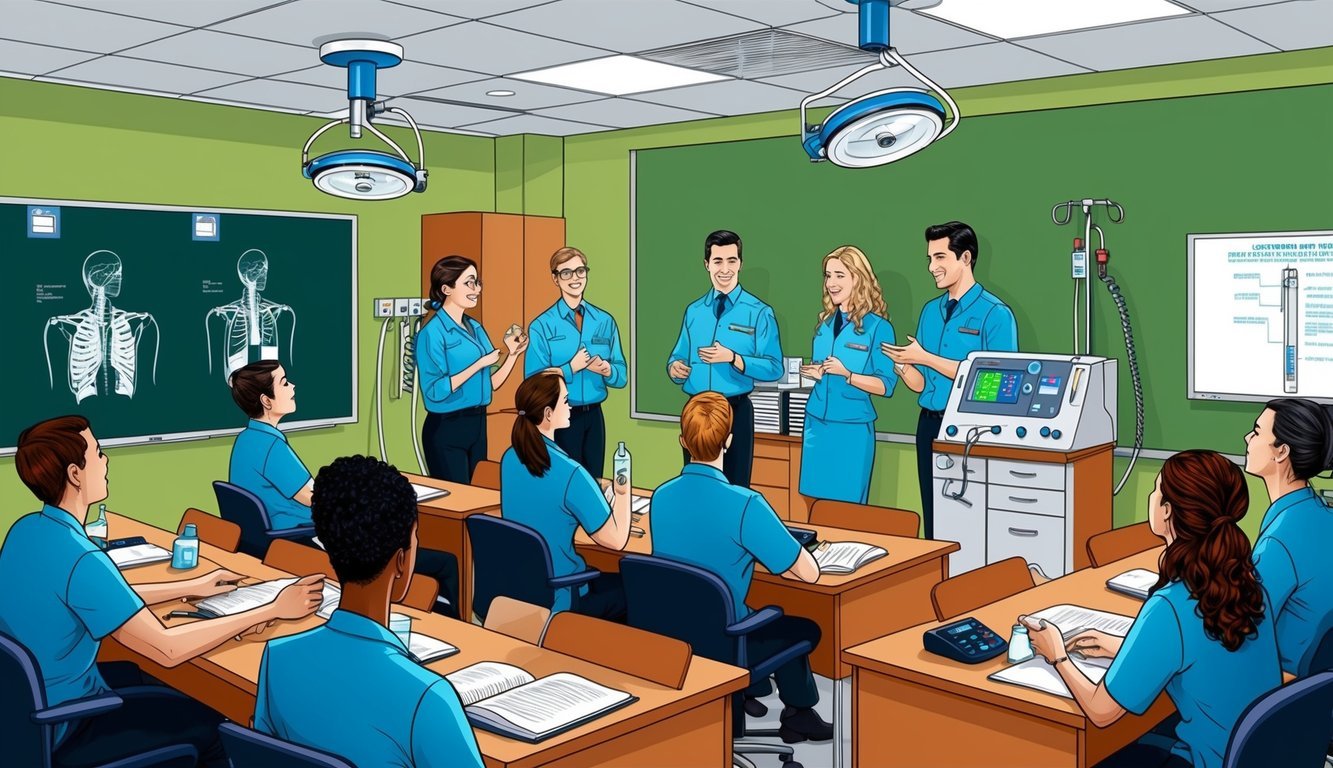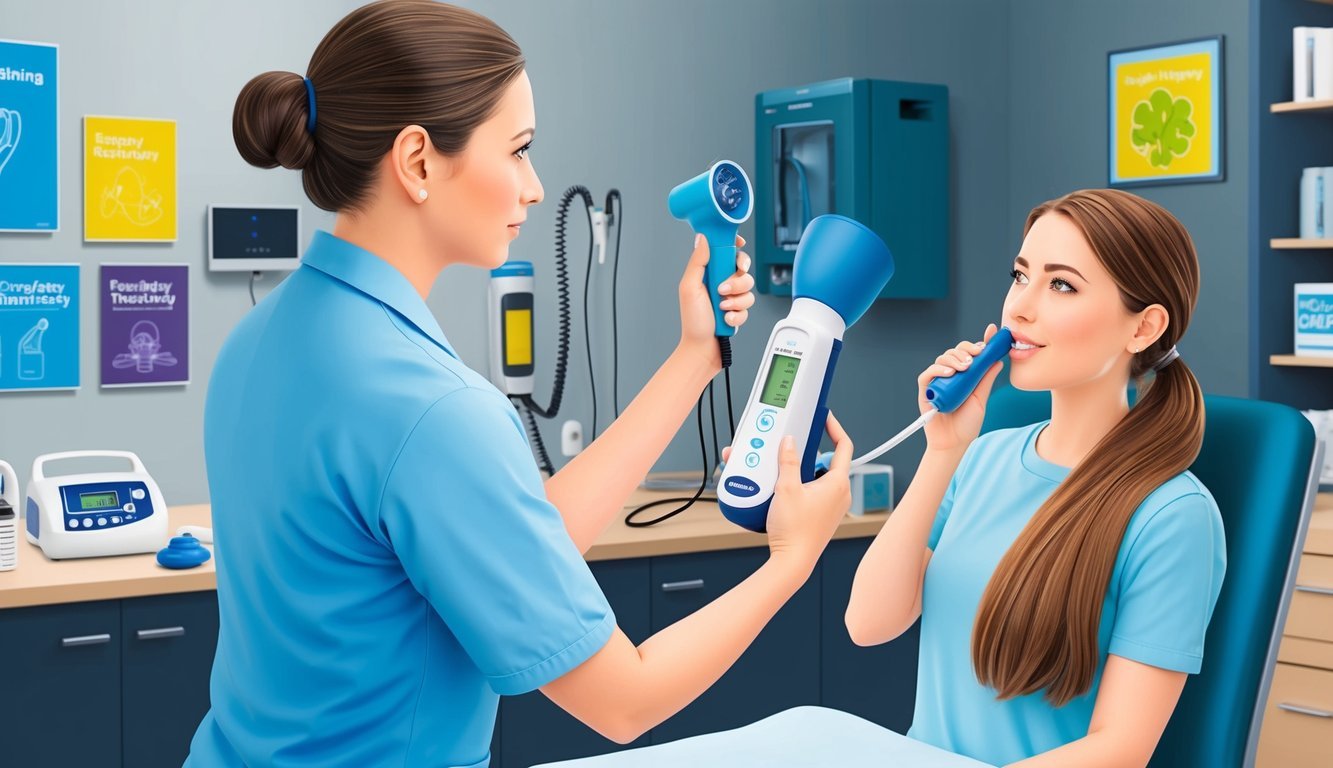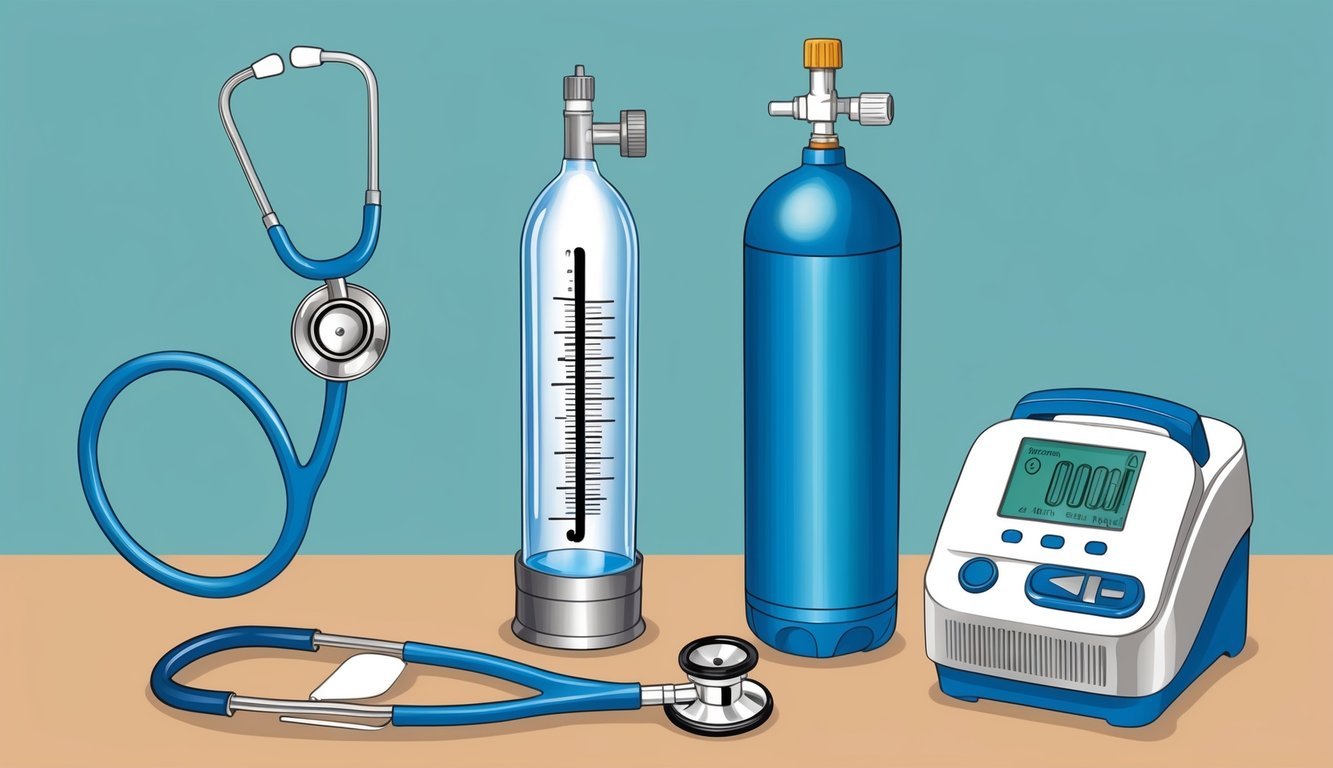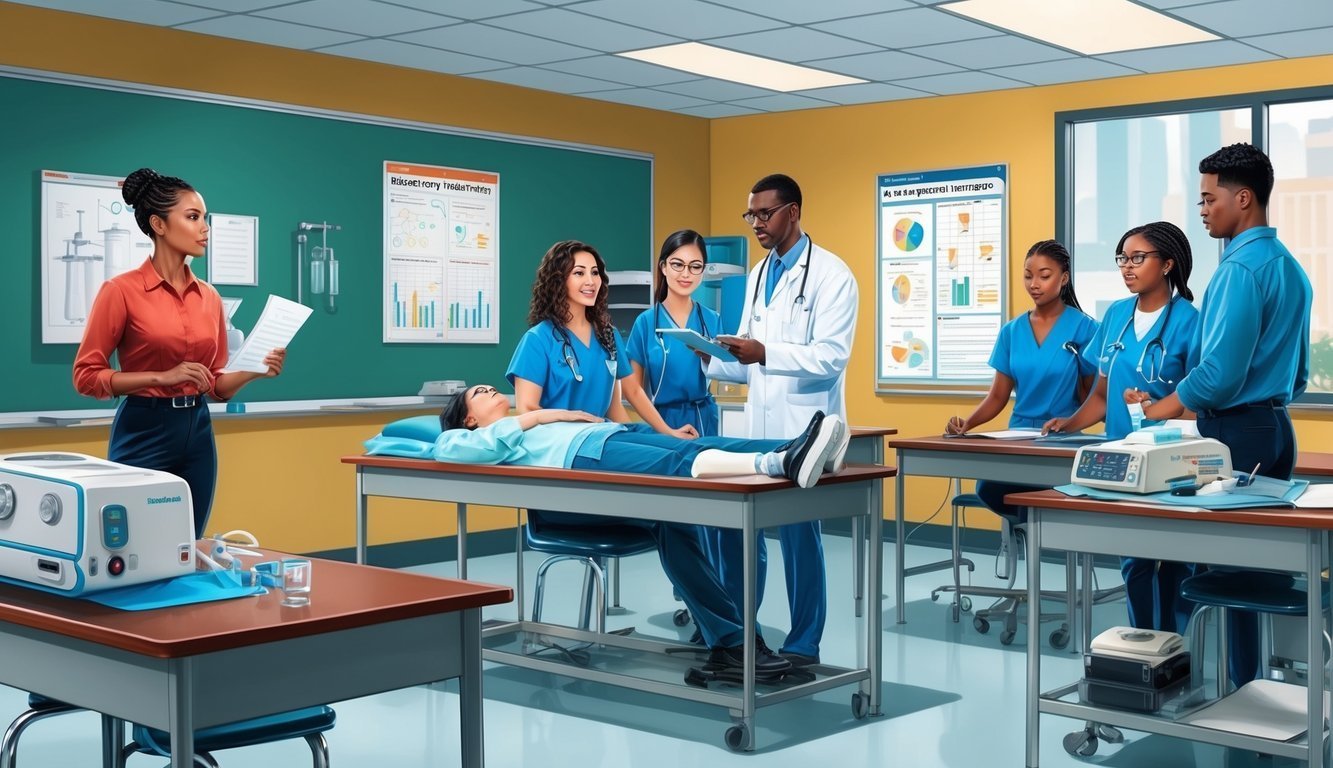Thinking about diving into a career in respiratory therapy? You’re on the right path! This field is booming and not just because of the good pay—respiratory therapists play a crucial role in helping folks breathe better and lead healthier lives.

Respiratory therapy programs average around $400 per credit, but don’t let that scare you! Plenty of schools offer online options that fit your schedule and budget, making it more accessible than ever.
Let’s check out four top programs that could jumpstart your journey in this rewarding field.
1) AARC Respiratory Care Institute

The AARC Respiratory Care Institute has some fantastic courses for budding respiratory therapists.
Here, you’ll find diverse options to sharpen your skills and knowledge.
One course to consider is the Pulmonary Rehabilitation Certificate Course.
It’s designed to make you an essential part of a pulmonary rehab team.
Want to crank up your leadership skills? Check out the Advanced Leadership Institute.
This program is loaded with modules focused on management, research, and education.
If you want to brush up on asthma care, there’s even a course based on the National Heart Lung and Blood Institute’s guidelines.
It’s an excellent way to stay current with best practices.
The AARC also runs AARC-University, where you can tap into a wide range of continuing education courses to keep your skills fresh.
These courses are tailored for you, offering practical and up-to-date knowledge to help you become a better respiratory therapist.
You’ll gain hands-on experience through interactive simulations, ensuring you can apply new skills in real life.
Some of the virtual reality courses included in the program provide immersive training to enhance your clinical skills.
With expert instructors and cutting-edge tech, you’ll be well-equipped to provide top-notch care to your patients.
2) Continuing Respiratory Care Education (CRCE) Program

Looking to up your game in respiratory therapy? The Continuing Respiratory Care Education (CRCE) Program offered by the American Association for Respiratory Care (AARC) is a smart move.
This program offers three different tracks, catering to management, education, or research—perfect for your growth in various areas of respiratory care.
Each track gives you 15 CRCE credits, which helps meet a good chunk of your yearly continuing education requirements.
It’ll cost you $225 per track if you’re an AARC member, but if you’re not, you can still participate for $320, which includes a one-year AARC membership.
Plus, you’ll get access to AARConnect, a vibrant online community.
The CRCE program is flexible, allowing you to learn at your own pace—ideal if you’re juggling work and family obligations.
Remember, keeping your skills sharp is essential in respiratory therapy.
This program helps you do just that and is a savvy way to stay ahead.
3) Respiratory Therapy Courses at Mayo Clinic
Want to elevate your respiratory therapy skills? Look no further than the Respiratory Care Program at the Mayo Clinic in Minnesota—it’s truly top of the line.
You’ll gain hands-on experience using state-of-the-art technology while learning from skilled therapists.
The program leads to a bachelor’s degree, paving the way for success in your career.
Post-graduation? Mayo Clinic also offers continuing education in pulmonary medicine, including live courses, podcasts, or online classes.
If rehabilitation interests you, check out their Pulmonary Rehabilitation Program.
You’ll learn how to assist patients with lung diseases, from infants to seniors, honing your ability to diagnose and treat various breathing problems.
4) University of Kansas: Respiratory Care Bachelor’s Degree
Are you ready to become a respiratory therapist? The University of Kansas offers a stellar bachelor’s degree in respiratory care.
You’ll learn to help patients with breathing and lung issues, making a real impact on their lives.
This program gives you plenty of options! You can study on-campus or take classes online.
It’s perfect if you’ve got a busy schedule or are already working in the field.
You’ll receive hands-on training in adult critical care, neonatal care, and pulmonary rehab, along with management skills for your future career.
Plus, KU is the only school in Kansas that offers a four-year respiratory care degree, giving you a unique advantage.
The job market looks promising, with experts predicting growth in the years ahead.
To earn your degree, aim for at least a C in all respiratory care classes, and total it up to about 120 credit hours.
It’s a solid move for those wanting to make a mark in healthcare.
Understanding Respiratory Therapy

Respiratory therapy is a key healthcare field aimed at helping people breathe easier.
It’s a satisfying career with plenty of opportunities to improve patients’ lives
What Is Respiratory Therapy?
At its core, respiratory therapy is all about helping people struggling with breathing issues.
As a respiratory therapist, you’ll work with patients of all ages—from newborns to the elderly.
You’ll use specialized equipment to treat conditions like asthma, emphysema, and pneumonia.
Your role will include administering breathing treatments, operating ventilators, and teaching patients how to manage their conditions effectively.
Respiratory therapists are found in hospitals, clinics, and even people’s homes, collaborating with doctors and nurses to provide comprehensive patient care.
Why Choose a Career in Respiratory Therapy?
Respiratory therapy is on the rise, with tons of job opportunities.
As the population ages, more people will need assistance with breathing issues.
Why not be the one to help them?
You’ll get to make a meaningful difference in people’s lives daily.
Just imagine helping someone take a pain-free deep breath for the first time in years!
The training programs are often shorter compared to many other healthcare careers.
You could be ready to start working after just two years of schooling.
Plus, respiratory therapy offers good pay and job security.
You’ll also have the option to specialize in areas like sleep disorders or critical care as your career progresses.
Course Curriculum Highlights

Courses in respiratory therapy cover essential topics while providing hands-on training, getting you ready for a rewarding career in healthcare.
Core Subjects in Respiratory Therapy
During your studies, you’ll dive into key areas of human health, including lung anatomy and the mechanics of breathing.
Classes will also cover respiratory diseases and the treatments available to patients.
Liberty University’s online program offers courses on cardiopulmonary science, helping you understand how the heart and lungs work together.
Many programs also teach you about using medical equipment like ventilators and oxygen therapy devices, along with medications that treat breathing problems.
Ethics and patient care are significant components of the curriculum, helping you learn how to connect effectively with patients and their families.
Hands-On Training Opportunities
Hands-on experience is a big part of respiratory therapy education.
You’ll practice using actual medical equipment in lab settings since nothing beats getting your hands dirty.
Youngstown State University offers clinical rotations, letting you work in real healthcare environments alongside seasoned professionals.
Many programs incorporate simulations, so you can practice treating mock patients in various scenarios.
This prepares you for the challenges you’ll face in real-world situations.
Your school might also have partnerships with local hospitals, allowing you to observe and assist respiratory therapists on the job.
And don’t forget about workshops or conferences! These opportunities can help you network and stay updated on the latest developments in the field.
Frequently Asked Questions

Choosing the right respiratory therapy program can feel overwhelming, but tackling a few common questions can help.
Here’s what you should think about concerning courses, online options, program length, and career prospects.
What criteria should I consider when choosing a respiratory therapy course?
When picking a respiratory therapy program, first check if it’s accredited by CoARC.
Look into the curriculum, clinical experience options, and the expertise of the faculty.
And don’t forget to factor in cost and location!
Can I complete a respiratory therapy program online, and what are the best options?
Absolutely! There are solid online respiratory therapy programs available.
Many schools offer bachelor’s completion programs for those who already have an associate degree, allowing you to finish your studies while working.
Are there accelerated respiratory therapy programs that take less than a year?
Most respiratory therapy programs usually take at least two years.
Accelerated options are pretty rare due to the hands-on nature of the field, but if you have a healthcare background, you might find a fast-tracked program.
What advanced degrees are available for respiratory therapists looking to further their education?
You can pursue a master’s degree in respiratory care or a related field like healthcare administration.
Some institutions even offer doctoral programs in respiratory therapy for those aiming for leadership or research roles.
How do I find the best respiratory therapy programs near me?
Start by checking local colleges and universities.
You can also use online resources to find accredited programs in your area.
If flexibility is key for you, don’t skip over online options!
What potential careers and salary expectations can respiratory therapists with advanced degrees expect?
With an advanced degree, you could step into roles like respiratory therapy manager or educator, which usually come with a higher salary.
As of May 2023, the median salary for respiratory therapists was around $77,960, but those with higher education often earn more.

